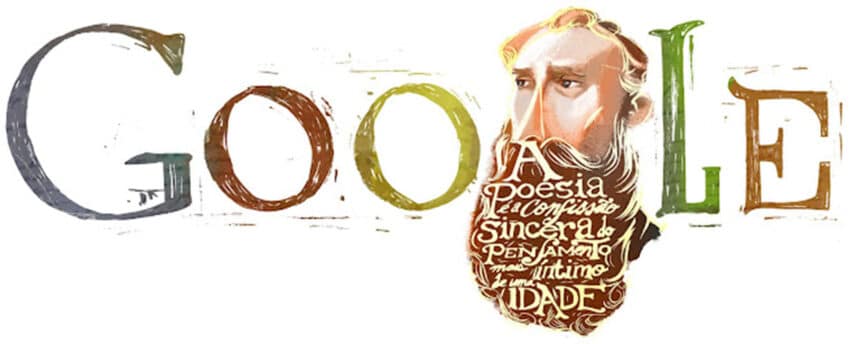Image Courtesy: Google Doodle
Antero de Quental (18 April 1842 – 11 September 1891) was a prominent Portuguese poet, philosopher, and writer who lived in the 19th century. He is known for his contributions to Portuguese literature, his involvement in political and social movements, and his philosophical ideas. His life, career, and legacy are marked by his literary works, his intellectual pursuits, and his impact on Portuguese society.
Life and Career
Antero de Quental was born on 18 April 1842, in Ponta Delgada, São Miguel, Azores, Portugal. He came from a wealthy family and showed an early aptitude for literature and languages. He moved to Lisbon in 1858 to study law at the University of Lisbon, but his true passion was poetry and literature. He soon became involved in literary circles and started publishing his poems in various newspapers and magazines.
In 1861, Quental co-founded the “Geração de 70” (Generation of 1870), a group of Portuguese writers and intellectuals who aimed to renew Portuguese culture and society. They were critical of the political and social situation in Portugal at the time and sought to bring about change through their literary works and intellectual activism. Quental’s poetry during this period often reflected his disillusionment with society and his desire for social reform.
As a poet and writer, Antero de Quental made significant contributions to Portuguese literature. His poems, characterized by their deep emotions, melancholy, and philosophical themes, are considered some of the finest examples of Portuguese Romanticism. His works often explored existential questions, social critique, and religious and philosophical ideas.
Quental’s most famous work is his collection of poems titled “Sonetos Completos” (Complete Sonnets), which was published posthumously in 1892. These sonnets are regarded as his masterpiece and are known for their introspective and introspective nature, reflecting his struggles with the contradictions of life, faith, and society.
Apart from his literary achievements, Quental was also known for his involvement in political and social movements. He was an advocate for republicanism, liberalism, and social justice. He was critical of the monarchy and the political establishment in Portugal at the time, and he used his writing and his intellectual activism to promote social and political change. Quental was also involved in the “Questão Coimbrã,” a literary and philosophical debate that took place in Coimbra, Portugal, in the 1860s, which had a significant impact on Portuguese intellectual and cultural history
He died on 11 September 1891 in Ponta Delgada at age of 49.
Award and Legacy
Antero de Quental’s legacy is multifaceted. His literary works have had a lasting impact on Portuguese literature and are still studied and admired today. His poems are considered masterpieces of Portuguese Romanticism, and his writings on existentialism, social critique, and religious and philosophical ideas continue to be studied and analyzed by scholars and readers alike.
Quental’s involvement in political and social movements also left a mark on Portuguese society. He was a voice for social justice and reform, and his activism inspired others to advocate for change. His ideas on republicanism and liberalism had a significant impact on Portuguese political thought, and his writings contributed to the intellectual and cultural history of Portugal.
Quental’s legacy also extends beyond Portugal. His philosophical ideas and literary works have been translated into several languages and have gained recognition internationally. He is regarded as one of the most important poets and thinkers of his time and has influenced generations of writers, poets, and intellectuals in Portugal and beyond.
In conclusion, Antero de Quental was a notable poet, philosopher, and writer whose life, career, and legacy are marked by his literary contributions, intellectual pursuits, and activism for social and political change. His works continue to be studied, admired, and celebrated, and his ideas have left a lasting impact
On 18 April 2012, Google celebrated Antero de Quental’s 200th Birthday with a doodle.

